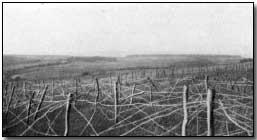Win 'The First World War: The Complete Series' DVD
The German siege of Verdun and its ring of forts, which comprised the longest battle of the First World War, has its roots in a letter sent by the German Chief of Staff, Erich von Falkenhayn, to the Kaiser, Wilhelm II, on Christmas Day 1915.
In his letter to the Kaiser, Falkenhayn argued that the key to winning the war lay not on the Eastern Front, against Russia – whom he believed was on the point of revolution and subsequent withdrawal from the war – but on the Western Front. He reasoned that if France could be defeated in a major set-piece battle Britain would in all likelihood seek terms with Germany, or else be defeated in turn.
In his letter to Wilhelm Falkenhayn believed that Britain formed the foundation of the Allied effort ranged against Germany and that she must be removed from the war. To that end he recommended implementation of a policy of unrestricted submarine warfare against merchant shipping, a policy directed squarely at starving Britain. This combined with a knock-out block to France would, he believed, bring about a successful conclusion to hostilities.
The Kaiser acted upon Falkenhayn’s recommendations, agreeing to the policy of unrestricted submarine warfare, dangerous as it was in running the risk of bringing the U.S. into the war. He also sanctioned implementation of a set-piece siege against Verdun, Falkenhayn’s choice of French target, starting in February 1916.
In so doing he agreed to switch focus from the Eastern Front to the Western Front. This latter strategy was not without its critics: in particular Paul von Hindenburg argued that the opportunity was lost to capture the bulk of the Russian army. Ultimately the failure of Falkenhayn’s recommendations cost him his position.
 If you would like to win a copy of this wonderful new 'The First World War: The Complete Series' DVD box-set, just answer this war trivia question: The task of besieging the ancient fortress town of Verdun fell to the German Fifth Army under Crown Prince Wilhelm. Originally scheduled to start on 12 February the offensive was postponed to 21 February on account of poor weather, preceded by a 21 hour preliminary bombardment. In this time period a verbal code (*two words*) was initiated between the fortress commander, Lieutenant Colonel Emile Driant, and the command leaders of his battalions. Referring to the moment that the land between his 200,000 defenders and the soon-to-advance one million German troops would suddenly be eaten up, this two worded phrase was their way of saying 'goodbye' and 'best of luck' without actually saying aloud such statements. Thus never allowing the fear of facing probable death to quickly form within his troops. From that viewpoint that they had established for themselves at the tip of the Verdun salient on the east bank of the Meuse River where he had posted his two battalions, the two word phrase went down in history as being symbolic of one man's sentiment towards his soldiers and their feelings therein.
If you would like to win a copy of this wonderful new 'The First World War: The Complete Series' DVD box-set, just answer this war trivia question: The task of besieging the ancient fortress town of Verdun fell to the German Fifth Army under Crown Prince Wilhelm. Originally scheduled to start on 12 February the offensive was postponed to 21 February on account of poor weather, preceded by a 21 hour preliminary bombardment. In this time period a verbal code (*two words*) was initiated between the fortress commander, Lieutenant Colonel Emile Driant, and the command leaders of his battalions. Referring to the moment that the land between his 200,000 defenders and the soon-to-advance one million German troops would suddenly be eaten up, this two worded phrase was their way of saying 'goodbye' and 'best of luck' without actually saying aloud such statements. Thus never allowing the fear of facing probable death to quickly form within his troops. From that viewpoint that they had established for themselves at the tip of the Verdun salient on the east bank of the Meuse River where he had posted his two battalions, the two word phrase went down in history as being symbolic of one man's sentiment towards his soldiers and their feelings therein.
Send us your answers and if you're correct you'll be in the running to win one of these wonderful new DVD box-sets! Just send us an e:mail here before May 15th with your answer and the subject title '1st World War DVDs' to: exclusivemagazine@flash.net
DVD Purchase Link
www.image-entertainment.com

